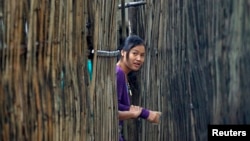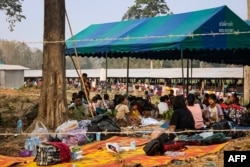The head of a Thai parliamentary committee that oversees border affairs and refugee camp officials told VOA the suspension by the United States of refugee admissions has halted a resettlement deal the U.S. struck with Thailand last year to take in thousands of Myanmar families.
About 90,000 refugees from Myanmar are in Thailand in a string of nine sealed-off camps along the countries’ shared border. Some have lived in the camps since the mid-1980s, fleeing decades of fighting between Myanmar’s military and ethnic-minority rebel groups vying for autonomy. Most are ethnic minority Karen.
After more than a year of talks and planning, the United States agreed to start taking in some of the refugees last year, although the U.S. State Department would not say how many of them might resettle. However, Thai lawmaker Rangsiman Rome, and an aid worker previously told VOA that local United Nations High Commissioner for Refugees staff told them in 2023 that it could be up to 10,000 per year, a claim the U.N. would not confirm or deny.
The first groups of 25 families left the camps for the United States in July.
U.S. President Donald Trump said that during the previous four years — the term of former President Joe Biden — “the United States has been inundated with record levels of migration, including through the U.S. Refugee Admissions Program,” and he suspended the program by executive order Jan. 20, effective a week later.
The administration is allowing only case-by-case exceptions, “until such time as the further entry into the United States of refugees aligns with the interests of the United States.”
The U.S. Embassy in Bangkok declined to comment to VOA on the order’s impact on the resettlement deal the United States and Thailand struck last year.
Asked about the deal’s fate, a U.S. State Department spokesperson told VOA it was “coordinating with implementing partners to suspend refugee arrivals to the United States” and refused further comment.
Rangsiman, who chairs the Thai House of Representatives National Security, Border Affairs, National Strategy and National Reform Committee, which monitors the refugee camps, confirmed Friday that Trump's order has put a stop to the deal, at least for the time being.
“We are aware that the deal is on hold but still waiting for updates from related departments if this deal can be renegotiated,” he told VOA.
Officials and spokespersons for the Thai government and ministries involved in managing the deal either refused to speak with VOA or did not reply to requests for comment.
Camp administrators told VOA that all work vetting and preparing the refugees in the camps for resettlement to the U.S., including interviews and medical checks, has stopped since the White House order.
“After the 20th, after the announcement, everything stopped,” said Nido, who goes by one name, the vice chairman of the committee managing day-to-day operations at the Umpiem camp in Tak province.
“On the 27th, many people from the camp had to go for their second vaccination. The doctors and nurses were there already preparing to vaccinate. But when the people arrived, they said there were some changes, so they had to stop the vaccination process. They told the people they will have to stop this process for a while, but they could not say for how long,” he said. “The interviews, the vaccinations — they had to stop it.”
Bweh Say, secretary of the Karen Refugee Committee that oversees the individual camp committees, said he was told by UNHCR staff that resettlement work was on hold across all the camps.
“Some of their staff, when we sit together, we talk together … they said [it has] stopped,” he said.
The UNHCR has been helping Thailand and the United States run the resettlement program, but it refused to comment to VOA on the impact of the suspension of the U.S. refugee admissions program, USRAP.
Camp officials and refugee advocates say the deal between Thailand and the U.S. was the only foreseeable chance in the near term for thousands of families to have a future other than as permanent refugees.
The Myanmar military’s overthrow of a democratically elected government in 2021 amplified violence in the country, setting off a civil war that has killed thousands of civilians.
Thailand itself will not allow the refugees to settle outside the camps and mostly denies them the chance to work or study outside the camps legally. Aid and advocacy groups that work with the refugees have described rising despair, drug abuse and violence.
No other country besides the United States has taken up Thailand’s call to resettle the refugees in large numbers.
“This [deal] is very important for the refugees. Some of us have been staying in the camps for decades — two or almost three. Children have been born here,” said Nido, a refugee himself who fled Myanmar nearly 20 years ago.
“The situation in Myanmar now is very terrible,” he said. “A lot of conflict and fighting. It’s not possible to go back. It’s also not possible to be recognized as a Thai national or to get Thai ID, and when you’re stateless, it is very hard to move around or find work.”
Inside the camps, jobs are hard to come by except for running a small shop or working with an aid group for a modest stipend. Schools are barred from teaching the Thai curriculum or language, leaving little chance for a higher education. Monthly food allowances, funded by international donors, barely keep pace with inflation.
Since Trump took office, the dismantling of the U.S. Agency for International Development also has compelled the clinics it was funding across the camps to close, forcing the refugees onto Thailand’s own public health care system. The Thai government has vowed to plug the gap, but media reports say it is struggling.
Some critics say the USAID programs are wasteful and promote an agenda that fosters dependence without addressing the root of the problem. A Justice Department official, Brett Shumate, said Friday, “The president has decided there is corruption and fraud at USAID,” although he did not detail the alleged mismanagement.
“If they could return [to Myanmar], if the situation [were] safe, of course everyone would want to return to their homes. But since it is impossible, then resettlement is one of their first options,” said Wahkushee Tenner, a former refugee from the camps who now runs the Karen Peace Support Network, a nongovernment group based in Thailand that advocates for the Karen.
“Resettlement is not the best option,” she said, “but there is no best … option.”






